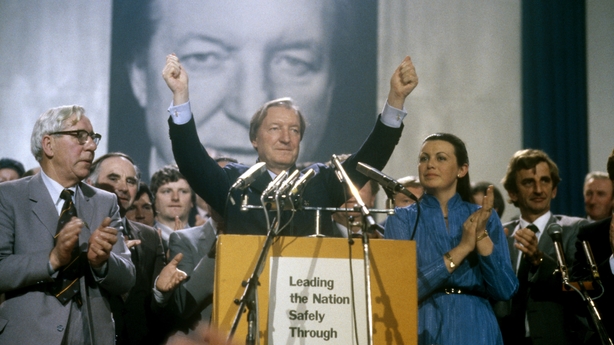The British secret service is world renowned and intelligence gathering is often cited as one area where Britain remains in the big league, writes RTÉ's London Correspondent John Kilraine.
With a tradition going back over a hundred years, the British secret service was at the forefront of anti communist espionage during the Cold War. It benefitted from a wealth of contacts and experience in the remnants of the British Empire which included many of the world's worst trouble spots.
During The Troubles the activities of British Intelligence through such shadowy organisations as the Force Research Unit (FRU) have been well documented and have included clandestine operations and black propaganda (also known as Psy Ops).
Given this background it is inconceivable that British Intelligence would not have taken an interest in the Republic of Ireland during this period. It was a country believed by the British government to be providing logistic and psychological support to the Provisional IRA's campaign.
While most previous investigations into the British secret service in Ireland have concentrated on the North, Enemy of the Crown by David Burke draws together alot of the evidence about its activities in the Republic, mainly involving MI6.
The main thesis of his book is that MI6 tried to keep Charles Haughey out of power and then undermined him following his election as Taoiseach. And that they were aided in this by high placed and unnamed moles in the Department of Justice and Gardai. He also points out that many British diplomats had a past with in intelligence services.
Anecdotes and gossip from Ireland were used to fuel damaging stories against Haughey, ending up in diplomatic cables to Washington or in the pages of Private Eye, according to the book. They ranged from gossip about his relationship with Terry Keane to a bizarre claim that Haughey was involved in a plot with the Provos to buy up bombed buildings in Belfast on the cheap and sell them on at a profit.

Others who were targeted included John Hume, who was accused of stealing money raised in America for charitable causes in Northern Ireland. This story, according to the book, was concocted along with forged documents by the Information Reasearch Deparment (IRD).
The IRD was a secret organisation within the British Foreign Office which was set up after the Second World War to counter communist propaganda. It quickly moved on to attacking pro independence groups in Malaysia, Egypt, Kenya and Cyprus as well as Northern Ireland.
John Peck, who was British Ambassador to Ireland from 1970 to 1973, was a former head of the IRD and has been described as instrumental in developing its activities. He was also formerly based in Cairo.
Peck is quoted from his own memoirs as urging all his staff to find out as much as they could about Ireland from politicians and members of the press.
And, as also discussed in the book, Britain's ambassador to Ireland when The Troubles began was Andrew Gilchrist. He had been involved in the Special Operations Executive (SOE) during the war. He was later British ambassador to Malaysia and was credited with starting a propaganda unit there which fanned an anti communist campaign. That involved the deaths of 500,000 people.
Burke quotes the biography of Maurice Oldfield, the former head of M16, which stated that his organisation had a network of "agents and informants inside the Garda (Irish Republican police), the Irish Army and some Republic government departments"
Burke says he has an official British government document showing that the IRD identified the Dublin Press as a "priority target" and that they had contacts who would take stories from them. These journalists are not named.
David Burke's book goes into much detail about Peck's time in Ireland and his friendship with Jack Lynch who of course was at one time was Charles Haughey's main rival in Fianna Fáil.
As the book acknowledges, British Intelligence did not have to work very hard to undermine Haughey given the antipathy towards him especially in the media and political worlds. Burke says if only the British had stuck to questions about his finances, they might have had more success.
It is also true that a lot of information is routinely passed between British and Irish public servants in the course of their work whether they are civil servants, police or politicians.
Conor Cruise O'Brien and former President Erskine Childers are mentioned in book as being sources of low grade information. Both men were implacable opponents of Haughey.
The sources for much of this comes from the memoirs and biographies of British diplomats, as well the release of British government archives. And most of it has appeared over the years in outlets such as Magill, The Phoenix, the Sunday World and by David Burke himself in articles for Village magazine.
However, assembling and establishing sources for such a mass of information – there is a lot more than can be covered in a book review - is a mammoth task.
Burke has produced a well researched book with an extensive bibliography, glossary of terms used, list of characters and an index that all endeavour to provide cross reference.
He also comes up with new revelations such as a German gun supplier being the MI6 source concerning an abortive arms shipment to Dublin in 1970. The guns were intended for the defence of Northern nationalists.
Enemy of the Crown is important piece of work that shines a light on an area that needs some exposure. It is also a good read.
An Enemy Of The Crown is published by Mercier Press

